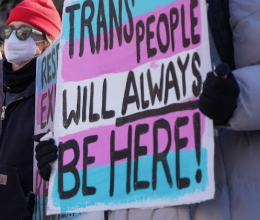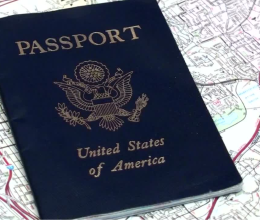
BOSTON – Attorneys representing transgender, nonbinary, and intersex Americans asked the Supreme Court today to reject a request from the Trump administration to stay a preliminary injunction in Orr v. Trump, a challenge to the Trump administration’s policy requiring that passports bear only a person’s sex designation assigned at birth.
“The lower courts have made abundantly clear how discriminatory and baseless the State Department’s new policy is and the harm it poses for hundreds of thousands of people like our clients,” said Li Nowlin-Sohl, Staff Attorney for the ACLU’s LGBTQ & HIV Project. “People across the country depend on identity documents that accurately reflect their identity–who they are in their workplaces, their schools, and their communities. The administration’s attempts to deny that right to transgender, nonbinary, and intersex people has no basis in law or policy, and we’ll continue to fight this policy until it is permanently defeated.”
"The Trump administration's attempt to deny accurate passports to hundreds of thousands of Americans would cause immediate, irreparable harm if allowed to take effect," said Jessie Rossman, legal director at the ACLU of Massachusetts. "Transgender, nonbinary, and intersex Americans rely on accurate identity documents to travel with safety, privacy, and dignity. We are asking the Supreme Court to reject this request for a stay and preserve the injunction issued below so our clients will be spared profound disruption and distress while their case proceeds."
On his first day in office in January 2025, Trump signed an executive order attempting to mandate discrimination against transgender people across the federal government and government programs. This included a directive to the Departments of State and Homeland Security “to require that government-issued identification documents, including passports, visas, and Global Entry cards” reflect a person’s sex “at conception.”
Within 48 hours, the State Department paused the processing of some passport applications submitted by transgender, intersex, and nonbinary people and returned others with a newly-issued passport marked with their sex assigned at birth. Over 214,000 public comments in opposition to the State Department’s new policy were collected by the ACLU and Advocates for Transgender Equality.
In February 2025, Orr v. Trump was filed by the American Civil Liberties Union, the ACLU of Massachusetts, and Covington and Burling LLP, on behalf of seven people who had not been able to obtain passports that match who they are because of the State Department’s new Passport Policy or were likely to be impacted by the new policy upon their next renewal. The complaint was filed in the federal District Court for the District of Massachusetts. The complaint was subsequently amended to add five additional transgender, nonbinary, and intersex plaintiffs and to seek to represent a class of transgender, nonbinary, and intersex passport holders. All twelve individual plaintiffs were appointed as class representatives.
In April, the court granted a preliminary injunction requiring the State Department to allow six transgender and nonbinary plaintiffs in Orr v. Trump to obtain passports with sex designations consistent with their gender identity or with an “X” sex designation while the lawsuit proceeds. In June, the court granted a class certification request expanding the preliminary injunction to cover all individuals who are currently or will be impacted by the policy in the future.
After the First Circuit Court of Appeals upheld that injunction, the Trump administration filed a stay request to the Supreme Court of the United States.
Under the preliminary injunction, a US passport with a sex designation that aligns with one’s gender identity or with an “X” sex designation should be made available by the State Department to anyone applying to:
Obtain a new passport,
Change the sex designation or update their name on their current passport
Replace a lost, stolen, or damaged passport, or
Renew their passport within one year of its expiration.
This includes those who, under the Trump administration’s policy, were previously sent a passport with a sex designation listing their sex assigned at birth after applying for a new, renewed, or replaced passport, and/or a changed name or gender marker.
Today’s filing can be found here.



